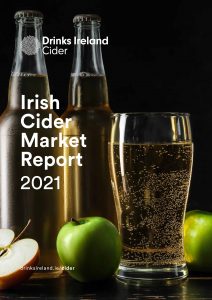Cider sales down 15% in 2021 compared to 2019

Drinks Ireland|Cider notes some signs of early recovery for cider in the report, as the second half of 2021 saw a 20% increase in sales which coincided with the easing of restrictions on the hospitality sector.
The Irish Cider Market Report 2021 shows that both domestic sales and exports fell drastically last year, with cider producers now calling for an excise reduction to support the sector as well as the urgent implementation of an excise relief programme for craft producers.
Cider, like beer, has a much higher proportion of sales in the hospitality sector compared to spirits and wine. With the on-trade shut or heavily restricted for large parts of 2020 and 2021 both in Ireland and in key export markets, last year domestic sales declined by 4.2% on 2020, which represents a fall of 15.1% in total since 2019.
According to Drinks Ireland|Cider Chairman and Chief Executive of Carlow Brewing Company Seamus O’Hara in the report, “In terms of cider share of the alcohol market, it has fallen by 1.1% to a share of 5.8%. In 2019, cider’s share of the alcohol market was 7.4% which was a fall of 1.6 points in two years”.
This fall is put down to people shifting to wine and spirits when consuming at home.
“In terms of per capita consumption, cider consumption has fallen by 5.6% in 2021 compared to the previous year. Total cider consumption in 2021 is down by 16.8% compared to 2019,” he said.
Despite the major challenges, Drinks Ireland|Cider says there’s some hope for optimism and signs of early recovery as the second half of 2021 saw a 20% increase in cider sales which coincided with the easing of restrictions on the hospitality sector.
“The full reopening of Ireland’s hospitality sector in January 2022 will hopefully provide a much-needed boost for the cider sector,” concluded Seamus O’Hara.
And a jump in sales in the last Quarter of 2021 indicates that cider is not just a ‘Summer seller’.
Exports-Imports
Exports were also very significantly hit, down by 57% in 2021 to an estimated value of €25 million while the value of imported cider has returned to pre-pandemic levels.
The most popular destinations for Irish cider are the UK (accounting for €9.2 million), the US (accounting for €8.3m), the Netherlands (€2.2m), Australia (€1.3m) and New Zealand (€200k) respectively.
Exports to the UK in particular “absolutely cratered” according to Jonathan McDade, Director of Drinks Ireland|Cider who told Drinks Industry Ireland, “Usually exports to the UK make up about 80-90% of cider exports but thanks to the shutdown of hospitality there, demand for cider was absent”.
It’s also likely that the UK distributors indulged in a bit of stockpiling ahead of various Brexit deadlines as cider can last much longer in the keg than beer.
Cider imports here were also down 15% with the main importers being the UK (€8.9m), Belgium (€1.3m), the Netherlands (€600k), the US (€500k) and Estonia (€300k).
Government take 3rd highest in Europe
But with 28% of the price of a pint of cider (or €1.58 of a pint costing on average €5.57) going in excise and VAT the trade body said that a full recovery and subsequent growth will be very challenging in the absence of support from Government and it has called for an excise cut on alcohol.
This would help bring Ireland in line with other countries, it says, as we currently ‘enjoy’ the third-highest excise on cider in Europe after Finland and Sweden.
“With native orchards and great quality diverse homegrown products, there’s huge opportunity for the Irish cider sector to mirror the success of other parts of the drinks industry like Irish craft beer and Irish gin,” said Seamus O’Hara.
Jonathan McDade, added, “We very much welcomed last year’s announcement that an excise relief programme would be rolled out for small cider producers in Ireland and look forward to seeing details in this year’s Finance Bill as this measure is urgent for the sector.
“In order to facilitate recovery, a wider alcohol excise cut is also vital. Currently, about 28% of a pint of cider is taken on tax. This is totally out of line with most of our European neighbours. A cut would support the sector, facilitating growth, the creation of jobs and in turn the wider economy.”









